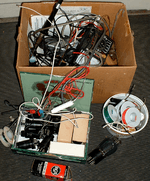junk
English
Pronunciation
- enPR: jŭngk, IPA(key): /dʒʌŋk/
- Rhymes: -ʌŋk
Etymology 1
From Middle English junke (“old cable, rope”), probably from Old French jonc (“rush”), from Latin iuncus (“rush”)[1].

A box full of junk (2)
Noun
junk (uncountable)
- Discarded or waste material; rubbish, trash.
- 2013 May 25, “No hiding place”, in The Economist, volume 407, number 8837, page 74:
- In America alone, people spent $170 billion on “direct marketing”—junk mail of both the physical and electronic varieties—last year. Yet of those who received unsolicited adverts through the post, only 3% bought anything as a result.
-
- A collection of miscellaneous items of little value.
- (slang) Any narcotic drug, especially heroin.
- 1961, William S. Burroughs, The Soft Machine, page 7
- Trace a line of goose pimples up the thin young arm. Slide the needle in and push the bulb watching the junk hit him all over. Move right in with the shit and suck junk through all the hungry young cells.
- 1961, William S. Burroughs, The Soft Machine, page 7
- (slang) The clothed genitalia.
- (nautical) Salt beef.
- Pieces of old cable or cordage, used for making gaskets, mats, swabs, etc., and when picked to pieces, forming oakum for filling the seams of ships.
- (dated) A fragment of any solid substance; a thick piece; a chunk.
- (Can we find and add a quotation of Lowell to this entry?)
Synonyms
Derived terms
- junkaholic
- junkball
- junk bond
- junk bottle
- junk conference
- junk DNA
- junk drawer
- junker
- junk food
- junkhead
- junkheap
- junk hook
- junkie, junky
- junk in the trunk
- junk job
- junkless
- junklike
- junk mail
- junkman
- junkpile
- junk ring
- junkroom
- junk science
- junkshop
- junk shot
- junk sick
- junk time
- junk vat
- junk wad
- junkware
- junkyard
Translations
rubbish, waste
|
|
miscellaneous items of little value
|
|
narcotic drug
Verb
junk (third-person singular simple present junks, present participle junking, simple past and past participle junked)
- (transitive) To throw away.
- (transitive) To find something for very little money (meaning derived from the term junk shop)
- (On Facebook, a record collector wrote:) "The newest addition to my Annette Hanshaw collection, I junked this beautiful flawless E-copy within walking distance from my house."
Synonyms
- (throw away): bin, chuck, chuck away, chuck out, discard, dispose of, ditch, dump, scrap, throw away, throw out, toss, trash
- See also Thesaurus:junk
Translations
Etymology 2
From Portuguese junco or Dutch jonk (or reinforced), from Javanese djong, variant of djung, from Old Javanese jong (“seagoing ship”).
Translations
Chinese sailing vessel
|
Bavarian
Etymology
From Middle High German junc, from Old High German jung, from Proto-Germanic *jungaz, from Proto-Indo-European *h₂yuh₁n̥ḱós.
References
- “junk” in Patuzzi, Umberto, ed., (2013) Ünsarne Börtar [Our Words], Luserna, Italy: Comitato unitario delle linguistiche storiche germaniche in Italia / Einheitskomitee der historischen deutschen Sprachinseln in Italien
Cimbrian
Alternative forms
- djung, jùngh
Etymology
From Middle High German junc, from Old High German jung, from Proto-Germanic *jungaz, from Proto-Indo-European *h₂yuh₁n̥ḱós.
References
- “junk” in Patuzzi, Umberto, ed., (2013) Ünsarne Börtar [Our Words], Luserna, Italy: Comitato unitario delle linguistiche storiche germaniche in Italia / Einheitskomitee der historischen deutschen Sprachinseln in Italien
North Frisian
Pronunciation
IPA(key): /jʊŋk/
This article is issued from
Wiktionary.
The text is licensed under Creative
Commons - Attribution - Sharealike.
Additional terms may apply for the media files.